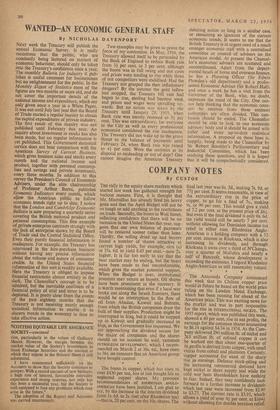WANTED-AN ECONOMIC GENERAL STAFF
By NICHOLAS DAVENPORT
NEXT week the Treasury will publish the annual Economic Survey. It is really monstrous that the public, who are constantly being lectured on matters of economic behaviour, should only be taken into the Treasury's confidence once a year. The monthly Bulletin for Industry it pub- lishes is useful comment for businessmen but no enlightenment for the public. In the Monthly Digest of Statistics most of the figures are two months or more old, and do not cover the important details of the national income and expenditure, which are only given once a year in a White Paper. It was not until July last year that the Board of Trade started a regular inquiry to obtain the capital expenditures of private industry. The first result of this inquiry was not published until February this year. An inquiry about investment in stocks has also been made, but no regular information is yet published. This Government statistical service does not bear comparison with the American Survey of Current Business, which gives business sales and stocks every month and the national income and product, together with personal consump- tion and savings and private investment, every three months. In addition to this survey the President's Council of Economic Advisers, under the able chairmanship of Professor Arthur Burns, publishes Economic Indicators every month, which aflow the American public to follow economic trends right up to date. I notice that the London and Catnkidge Economic Bulletin is now preparing a quarterly series covering the British national product and personal consumption. This fine example of private enterprise contrasts strongly with the lack of enterprise shown by the Board ' of Trade and the Central Statistical Office. Even their purely financial information is inadequate. For example, the Treasury has intervened in the hire-purchase business without having any precise information about the volume and nature of consumer credits. In the United States financial information of this sort is readily available. Here the Treasury is obliged to impose financial restrictions almost entirely in the dark. The Chancellor's courage is to be admired, but the inevitable costliness of a financial policy of trial and error is to be deplored. It is pretty clear from the events of the past eighteen months that the Treasury is not receiving nearly enough statistical, information to enable it to discern trends in the economy in time to take effective action.
Two examples may be given to prove the force of my contention. In May, 1954, the Treasury allowed itself to be persuaded by the Bank of England to reduce Bank rate from 3+ per cent. to 3 per cent. although the boom was in full swing and our costs and prices were tending to rise while those of our competitors were stabilised. Had the Treasury not grasped the then inflationary dangers? By the autumn the gold inflow had stopped, the Treasury bill rate had begun to rise, sterling had become weak and prices and wages were spiralling up- wards. But no action was taken by the Treasury until January 28. 1955, when Bank rate was merely restored to 31 per cent. This was extraordinary, for everyone in the City as well as every professional economist considered the rise inadequate. The Treasury did not wake tip to the grave threat to the balance of payments until February 24, when Bank rate was raised to 4) per cent. Were the statistics at its disposal so misleading or out of date? One cannot imagine the American Treasury
delaying action so long in a similar case, or remaining so ignorant of the current economic trends. It seems to me that the British Treasury is in urgent need of a much stronger economic staff with a centralised committee or council of advisers on the American model. At present the Chancel- lor's economic advisers are scattered and uncoordinated. Apart from the depart- mental heads of home and overseas finance, he has a Planning Officer (Sir Edwin Plowden's old department) and a profes- sional Economic Adviser (Sir Robert Hall), and once a week be has a visit from the Governor of the Bank, who, no doubt, expresses the mind of the City. One can- not help thinking that the economic coun- sels he receives from these eminent authorities are often divided. This con- fusion should he ended. The Chancellor should be able to look to one economic advisory body and it should be armed with fuller . and more up-to-date statistical information. A proposal on these lines is. happily, being made to the Chancellor by Sir Robert Boothby's Parliamentary and Industrial Committee, which has been studying these questions, and it is hoped that it will be sympathetically considered.


































 Previous page
Previous page